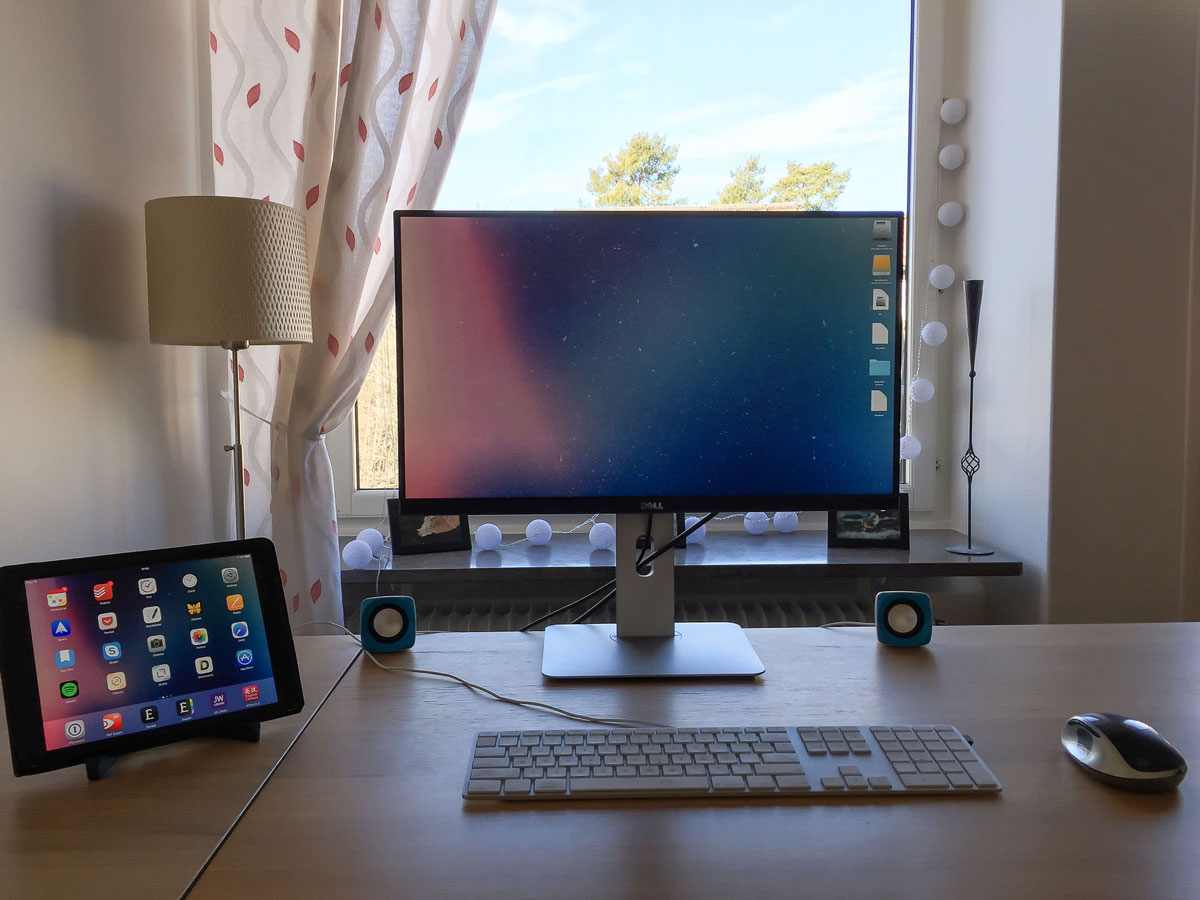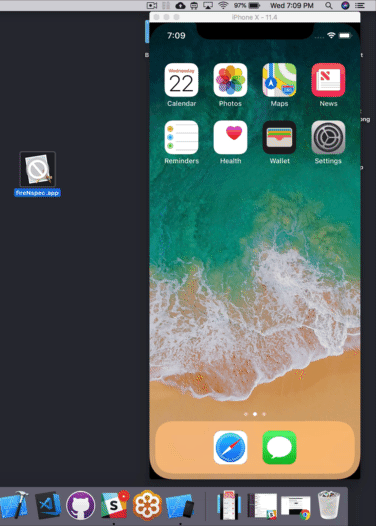
Emulate Ios App On Mac Computer
An iOS Emulator refers to the software that runs on MAC and allows the users to create a virtual environment for mobile operating systems. By using an iOS Emulator, the user can install and run all the apps and games as can be done on an iPhone. App or game developers use iOS Emulators to properly scale or test their applications.

 «12»
«12»Comments

Run Ios Apps On Mac Simulator
I want to run an iOS app (eWeLink) using the Appetize service, which I believe is an emulator. My goal is to be able to control my light switches from my Mac using the eWeLink app. In order to do that, I have to get the app as a a.zip or.tar.gz file containing the compressed.app bundle. Bonus: Apple M1 Macs. If none of the emulators seem to be doing the job for you, currently the best way to run iOS apps on a computer is just by using the new Apple M1 MacBooks and Mac Mini. These devices run on Apple’s new ARM chipsets and they can run iPhone apps with ease. You can find the iPhone apps in a separate section in Mac App Store.

Ipad Emulator For Mac
- So either iDOS 2 has changed something, Apple has changed the developer rules, or Apple has misinterpreted its own rules since 2014. If it is the latter, that is not the fault of the developer and Apple should therefore not punish the developer for its mistake. Changing the rules isn't much better. Either would be just another bullet in the chamber for the antitrust regulators.edited July 22
- I’m a pretty big Apple fan but whoever is in charge of the App Store is a straight up idiot. Stupid stuff like this is only contributing to the scrutiny of the App Store and literally bringing its future into question.
- I think Apple's guideline rejecting executing code is needs to be eliminated -- an emulator is an emulator.edited July 22
In reality, executing code in an emulator is what programs do. For example, PDF files are themselves computer programs which instruct and iPad how to render a PDF visually.
Isn't programs as data and data as programs the basic principle of computing?
I understand why Apple rejects executable code - it could allow app stores within an app for example unless prevented by further guidelines (not saying that's necessarily a bad thing, but thats's likely their angle). That executed code could be further sandboxed to prevent viruses or malware. But then I think it's too broad to ban all executable code since it covers emulation too. But you're not right on how programs load data files; data is not always a program. Most data files are little more than scripts, that are interpreted by a host program. That is different to executables (which run directly on a CPU). A PDF file is not a computer program, it does not execute on the CPU but contains instructions for an interpreter to process to generate the page. Similarly to HTML.I think Apple's guideline rejecting executing code is needs to be eliminated -- an emulator is an emulator.
In reality, executing code in an emulator is what programs do. For example, PDF files are themselves computer programs which instruct and iPad how to render a PDF visually.
Isn't programs as data and data as programs the basic principle of computing?- This is straight up why I use Chromebooks instead of iPads: being able to install and run executable and arbitary code is an unconditional requirement. I mean for cheap stuff like the $80 Wal-Mart and Amazon Kindle Fire Android tablets that I just use as e-readers and for Netflix yeah fine doesn't matter. But anything that I pay real money for and use for work or school? Needs to run arbitrary code. That is why that 'the tablet that can replace your PC' iPad commercials never applied to me, and the A12Z and M1 being faster than anything below an octacore Intel Core i7 didn't matter either. Can't run what I need means can't use it.
- This is why sideloading or alternative app stores would be great on iPadOS and iOS. Here we have a perfectly legal app that has been in the store for years, now suddenly being booted, arbitrarily.edited July 22There are so many ideas for Apps that Apple would never allow in its App Store. Here we have Apple restricting trade between a perfectly legal app and would-be customers. Who is Apple to restrict such trade? Just a matter of time before some government some where says “no” to Apple’s shenanigans.Meanwhile, despite Apple’s locked down ecosystem, which allegedly exists in the name of security, Pegasus has shown us that the locked down iPhone isn’t as secure as Apple lets on.
Apples and oranges ... a Chromebook is a (sorta) laptop, whereas the iPad is a tablet.This is straight up why I use Chromebooks instead of iPads: being able to install and run executable and arbitary code is an unconditional requirement. I mean for cheap stuff like the $80 Wal-Mart and Amazon Kindle Fire Android tablets that I just use as e-readers and for Netflix yeah fine doesn't matter. But anything that I pay real money for and use for work or school? Needs to run arbitrary code. That is why that 'the tablet that can replace your PC' iPad commercials never applied to me, and the A12Z and M1 being faster than anything below an octacore Intel Core i7 didn't matter either. Can't run what I need means can't use it.
Mac laptops are not restricted in this manner.
Chrome OS tablet
Apples and oranges ... a Chromebook is a (sorta) laptop, whereas the iPad is a tablet.This is straight up why I use Chromebooks instead of iPads: being able to install and run executable and arbitary code is an unconditional requirement. I mean for cheap stuff like the $80 Wal-Mart and Amazon Kindle Fire Android tablets that I just use as e-readers and for Netflix yeah fine doesn't matter. But anything that I pay real money for and use for work or school? Needs to run arbitrary code. That is why that 'the tablet that can replace your PC' iPad commercials never applied to me, and the A12Z and M1 being faster than anything below an octacore Intel Core i7 didn't matter either. Can't run what I need means can't use it.
Mac laptops are not restricted in this manner.
iPadOS tablet
No, PDF is a document format. It doesn’t run, it’s rendered, same with music files. But that’s not the real problem.I think Apple's guideline rejecting executing code is needs to be eliminated -- an emulator is an emulator.
In reality, executing code in an emulator is what programs do. For example, PDF files are themselves computer programs which instruct and iPad how to render a PDF visually.
Isn't programs as data and data as programs the basic principle of computing?The emulator allows apps to run code that can’t be seen or examined by Apple, and that has always been against the rules. PDFs, the other hand, are pretty benign. It would be quite hard to piggyback an App Store in a PDF document.So the real problem is the lack of consistency in applying the rules. This should never have been allowed in the App Store in the first place, so they’re going to look like real dicks for removing it now.- This is why sideloading or alternative app stores would be great on iPadOS and iOS. Here we have a perfectly legal app that has been in the store for years, now suddenly being booted, arbitrarily.There are so many ideas for Apps that Apple would never allow in its App Store. Here we have Apple restricting trade between a perfectly legal app and would-be customers. Who is Apple to restrict such trade? Just a matter of time before some government some where says “no” to Apple’s shenanigans.Meanwhile, despite Apple’s locked down ecosystem, which allegedly exists in the name of security, Pegasus has shown us that the locked down iPhone isn’t as secure as Apple lets on.So let’s get this reply above straight:
A, umm, Apple bad for lock down eco, it only “allegedly” to protect customer. We want open to internet load.
—then
B, Pegasus shows there’s bad stuff out there for Apple.A + B = you’re an embarrassment to low thinking posters (and that’s a low bar already). People actually type and send this discombobulated embarrassment. An odious contradiction contained within their own post sprinkled with indignation that everything they typed is so right.So you be smart just once, just one time, and go to the Android platform. That’s Apple’s eco and its users instant improvement by subtraction. Buh bye…
Wow, and you got 4 likes. Counting you that’s 5 people who, in lieu of an IPad, will be buying Chromebooks to bask in the freedom of running arbitrary code. Best Buy better hire more staff PDQ, there’s sure to be a run on this all over the world. And Apple’s position as the tablet market leader is going to be in biiiig trouble, I’m sure. Of course data is quite clear that Chromebooks are overwhelmingly eating into Windows’ market share. iPad sales have no metric to suggest they are tangibly affected by Chromebook sales — save you and the four.This is straight up why I use Chromebooks instead of iPads: being able to install and run executable and arbitary code is an unconditional requirement. I mean for cheap stuff like the $80 Wal-Mart and Amazon Kindle Fire Android tablets that I just use as e-readers and for Netflix yeah fine doesn't matter. But anything that I pay real money for and use for work or school? Needs to run arbitrary code. That is why that 'the tablet that can replace your PC' iPad commercials never applied to me, and the A12Z and M1 being faster than anything below an octacore Intel Core i7 didn't matter either. Can't run what I need means can't use it.Apple has never positioned iPads as a purchase over a Macbook. Those have been and are two important and distinct revenue categories. Notice IPads don’t run MacOS, even IPads that have M1s? Apple sells the differing user experience devices to each market’s user segment needs. Quite successfully too, right? 6 to 9 billion worth of each device category every single 3 months, dayum!See that’s not so hard to understand is it? If it is then whip out your new Chromebook and start executing arbitrary code to assist in cracking this ‘data presented->reach obvious conclusion’ puzzle.
Why has his use case angered you so much? He never claimed to represent a large market segment.
Wow, and you got 4 likes. Counting you that’s 5 people who, in lieu of an IPad, will be buying Chromebooks to bask in the freedom of running arbitrary code. Best Buy better hire more staff PDQ, there’s sure to be a run on this all over the world. And Apple’s position as the tablet market leader is going to be in biiiig trouble, I’m sure. Of course data is quite clear that Chromebooks are overwhelmingly eating into Windows’ market share. iPad sales have no metric to suggest they are tangibly affected by Chromebook sales — save you and the four.This is straight up why I use Chromebooks instead of iPads: being able to install and run executable and arbitary code is an unconditional requirement. I mean for cheap stuff like the $80 Wal-Mart and Amazon Kindle Fire Android tablets that I just use as e-readers and for Netflix yeah fine doesn't matter. But anything that I pay real money for and use for work or school? Needs to run arbitrary code. That is why that 'the tablet that can replace your PC' iPad commercials never applied to me, and the A12Z and M1 being faster than anything below an octacore Intel Core i7 didn't matter either. Can't run what I need means can't use it.Apple has never positioned iPads as a purchase over a Macbook. Those have been and are two important and distinct revenue categories. Notice IPads don’t run MacOS, even IPads that have M1s? Apple sells the differing user experience devices to each market’s user segment needs. Quite successfully too, right? 6 to 9 billion worth of each device category every single 3 months, dayum!See that’s not so hard to understand is it? If it is then whip out your new Chromebook and start executing arbitrary code to assist in cracking this ‘data presented->reach obvious conclusion’ puzzle.- 'Betrayal to paying customers'....people really pay money to run a DOS emulator on an iPhone in 2021?
Yeah. The consistency is the problem....
So the real problem is the lack of consistency in applying the rules. This should never have been allowed in the App Store in the first place, so they’re going to look like real dicks for removing it now.
I have reported an app which was using its own paying mechanism (entering a credit card number information within the app).
But it took Apple 3 or 4 representatives to understand why it is a problem (even though I have been pointing out on Epic's case).
Either I don't understand it or they are really inconsistent in applying the rules (or both ).
That’s what your parents said about you.This is why sideloading or alternative app stores would be great on iPadOS and iOS. Here we have a perfectly legal app that has been in the store for years, now suddenly being booted, arbitrarily.There are so many ideas for Apps that Apple would never allow in its App Store. Here we have Apple restricting trade between a perfectly legal app and would-be customers. Who is Apple to restrict such trade? Just a matter of time before some government some where says “no” to Apple’s shenanigans.Meanwhile, despite Apple’s locked down ecosystem, which allegedly exists in the name of security, Pegasus has shown us that the locked down iPhone isn’t as secure as Apple lets on.“A + B = you’re an embarrassment to low thinking posters (and that’s a low bar already). People actually type and send this discombobulated embarrassment.”
Windows tablets are not restricted in this manner either. Being a tablet doesn’t automatically mean it has to have restrictions on what can run.
Apples and oranges ... a Chromebook is a (sorta) laptop, whereas the iPad is a tablet.This is straight up why I use Chromebooks instead of iPads: being able to install and run executable and arbitary code is an unconditional requirement. I mean for cheap stuff like the $80 Wal-Mart and Amazon Kindle Fire Android tablets that I just use as e-readers and for Netflix yeah fine doesn't matter. But anything that I pay real money for and use for work or school? Needs to run arbitrary code. That is why that 'the tablet that can replace your PC' iPad commercials never applied to me, and the A12Z and M1 being faster than anything below an octacore Intel Core i7 didn't matter either. Can't run what I need means can't use it.
Mac laptops are not restricted in this manner.- Apple must make a distinction between loading app running natively, and emulation within the sandbox of an emulator.
Every Game that load additional levels from an external file does in essence the same thing.
For similarly stupid reasons I can’t run a NeXT emulator on the iPad Pro, and frankly, running my entire NeXT legacy setup (“giant 8GB HDD with four 2GB partitions”, 256MB RAM, 40MHz 32-bit CPU) is something the iPad Pro could emulate while essentially idling.
The AppStore restrictions against emulators and virtual machines are ludicrous.
Just as the restrictions of not loading macOS as dual-boot or VM on an iPad Pro with MagicKeyboard.
Both are artificially crippling a powerful product.
No, a PDF is a program. Just because a PDF can be labeled a document doesn’t mean it’s not a program. You need to take abstraction up a level.
No, PDF is a document format. It doesn’t run, it’s rendered, same with music files. But that’s not the real problem.I think Apple's guideline rejecting executing code is needs to be eliminated -- an emulator is an emulator.
In reality, executing code in an emulator is what programs do. For example, PDF files are themselves computer programs which instruct and iPad how to render a PDF visually.
Isn't programs as data and data as programs the basic principle of computing?The emulator allows apps to run code that can’t be seen or examined by Apple, and that has always been against the rules. PDFs, the other hand, are pretty benign. It would be quite hard to piggyback an App Store in a PDF document.So the real problem is the lack of consistency in applying the rules. This should never have been allowed in the App Store in the first place, so they’re going to look like real dicks for removing it now.A previous commenter also suggested that a program must be executed on the CPU. That’s also not correct.
In designing systems, one is always trading off between the “executable” and the “data”. Different languages tend to encourage marking the boundaries differently, but it remains that these boundaries between data and executable are quite arbitrary.In a micro programmed CPU, your “executable” is just data. To the hardware guys, the micro program is just data which drives NAND gates and voltage changes.
It’s not an executable. That’s the issue.
No, a PDF is a program. Just because a PDF can be labeled a document doesn’t mean it’s not a program. You need to take abstraction up a level.
No, PDF is a document format. It doesn’t run, it’s rendered, same with music files. But that’s not the real problem.I think Apple's guideline rejecting executing code is needs to be eliminated -- an emulator is an emulator.
In reality, executing code in an emulator is what programs do. For example, PDF files are themselves computer programs which instruct and iPad how to render a PDF visually.
Isn't programs as data and data as programs the basic principle of computing?The emulator allows apps to run code that can’t be seen or examined by Apple, and that has always been against the rules. PDFs, the other hand, are pretty benign. It would be quite hard to piggyback an App Store in a PDF document.So the real problem is the lack of consistency in applying the rules. This should never have been allowed in the App Store in the first place, so they’re going to look like real dicks for removing it now.A previous commenter also suggested that a program must be executed on the CPU. That’s also not correct.
In designing systems, one is always trading off between the “executable” and the “data”. Different languages tend to encourage marking the boundaries differently, but it remains that these boundaries between data and executable are quite arbitrary.In a micro programmed CPU, your “executable” is just data. To the hardware guys, the micro program is just data which drives NAND gates and voltage changes.- I don’t understand why executables in an emulator are an issue. Aren’t they effectively sandboxed and incapable of impacting the host OS?edited July 23
In the old days, Apple banned emulators. Then a bunch of corporate-developed emulators arrived and Apple must have changed the rules to appease the money that could come in via a legit-branded/licensed Atari emulator (I cant remember what brand it was), and then the limit was... ??? Only built-in games? No external addition of games?
They originally banned demos too, but what do we have now with the IAP system? Tons of apps that are basically just demos unless you pay (or pay MORE) inside the app to activate the features that make it more than a mere demo.
So long as you can get Apple in the loop on making more profit, apparently the rules will be adjusted to accommodate you as a developer.